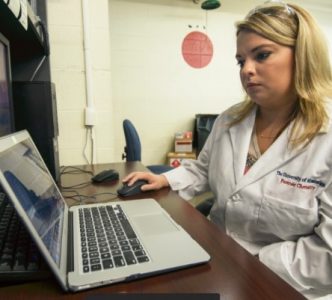Forensic Chemistry
What does it mean to major in forensic chemistry?
Forensic chemists apply the principles and tools of chemistry to the analysis of evidence in criminal investigations. Our students focus on analytical chemistry and biochemistry/molecular biology, with a capstone internship experience and participation in research, experiences that are not common in other forensic science programs.
Forensic chemistry majors develop strong problem-solving skills. Understanding evidence requires tools from many disciplines, including chemistry, biology, materials science, and genetics. Public speaking skills and scientific competence are important characteristics for this career as forensic chemists must often explain what was found and how they arrived at their conclusions.
The fact sheet provides a summary of the major, information about the program, and our alumni. The degree sheet gives the specific requirements and a sample 4-year curriculum plan.
Why is UM a good place to study forensic chemistry?
Ranked nationally, forensic chemistry is one of only a few chemistry programs accredited by the Forensic Education Programs Accreditation Committee. It is the only FEPAC accredited program in the country with both an internship and senior research requirement. The 10-week internship at a state or federal crime laboratory provides the student with a real-life crime laboratory atmosphere to decide if this is truly the desired career path one wishes to take. Internships also provides the crime laboratory with the opportunity to recruit the student for future crime laboratory employment. Students must also perform original research that must be presented to a minimum of three faculty members or presented at local, regional, or national conferences.
What can forensic chemistry majors do after graduation?
A liberal arts education empowers and prepares students to deal with complexity and change through a broad knowledge of the world. They gain key skills in communication, problem-solving, and working with a diverse group of people. Majors can gain employment in forensic chemistry labs associated with state or local police departments, the medical examiner’s office, forensic services lab, or the Federal Bureau of Investigation. There are also some private forensic labs.
Our forensic chemistry alumni are working in many sectors of the economy, with the top six sectors for their employer shown in the infographic. The largest percentage of alumni are working for government (primarly crime labs and other law enforcement settings), higher education, and STEM firms including private science labs.
Recent Alumna
Caroline Spencer (BS forensic chemistry, minor in French ’14; PhD in chemistry ’19)

“My interest in chemistry started in high school but I was not sure about my major. During one of my visits to Ole Miss, someone mentioned the forensic chemistry program and I was immediately interested. I then found out that the program was a part of the Academic Common Market, so I could receive an out-of-state tuition scholarship.”
Spencer earned a scholarship to complete a three week UK study abroad program, CSI: Leicester, at the University of Leicester, known for the discovery of DNA fingerprinting in the 1980s. This study abroad program led her to return to Leicester to work with Dr. John Bond for an internship where they developed fingerprints on receipts, or thermal paper. This research was published in the Journal of Forensic Sciences.
While earning her PhD in Chemistry at UM, Spencer presented at conferences around the country on her forensic chemistry research, including DNA analysis, drug analysis and illicit drug studies using computational chemistry. She traveled around the state to train with forensic scientists. She is currently an Analytical Lab Manager at STI Electronics Inc.
Why study forensic chemistry at UM? “UM has one of the top forensic chemistry programs in the country. We offer a wide variety of classes to cover most areas of forensic science, such as DNA, toxicology, analytical chemistry, criminal justice and many more. Our program is also unique in that it requires both research experience and a summer internship. Internships are a fantastic way to gain hands-on experience in the field and can lead to potential employment opportunities following graduation.”
For more information
Dr. Gregory Tschumper, Chair and Professor of Chemistry and Biochemistry
Department of Chemistry and Biochemistry
322 Coulter Hall
The University of Mississippi
University, MS 38677
(662) 915-7301 | chemistry@olemiss.edu